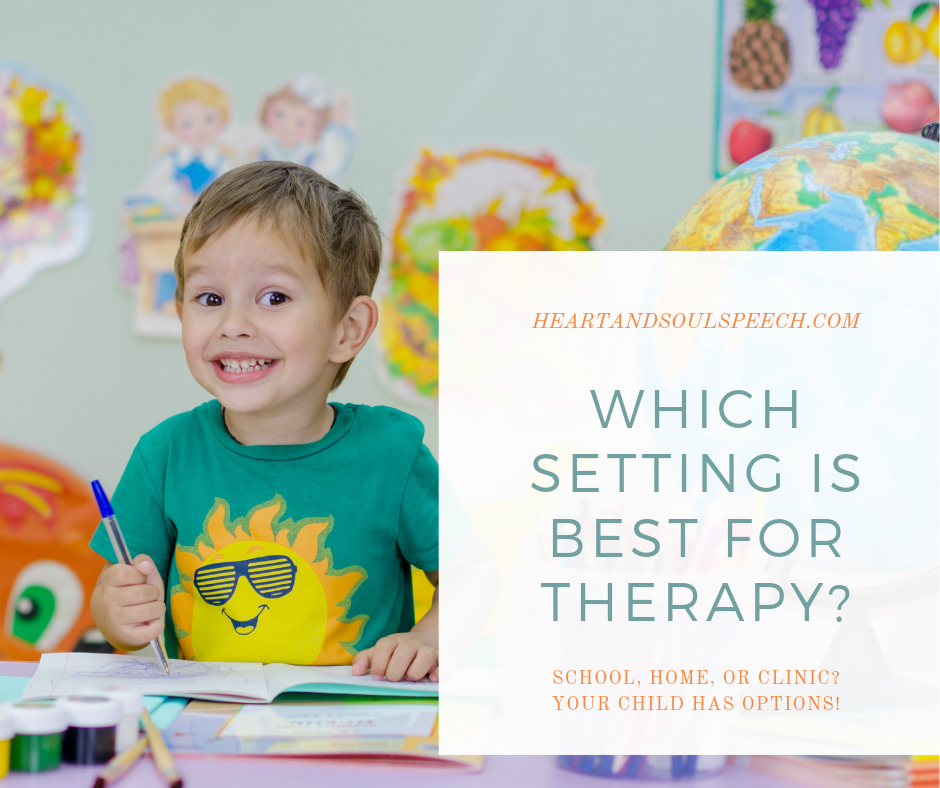Sorting through the many options your child has when it comes to speech therapy can be overwhelming! So, let’s break it down to help figure out what’s available in each setting when it comes to your child’s needs.

Speech-Language Pathologists Across Settings
First, it’s important to note: All speech-language pathologists (SLPs) must meet the same basic requirements to practice, in ALL settings in the United States.
- SLPs must have a state license to practice. The process for getting a state license differs across states, but majority follow the same guidelines. Speech-language pathologist Assistants (SLP-A) must also abide by state licensure laws.
- Most SLPs are also nationally certified and have a “Certificate of Clinical Competence.” (That’s why we have “CCC-SLP” behind our name.) In order to obtain this, SLPs must graduate with a Master’s degree from an accredited university, pass a national Praxis exam, and complete a clinical fellowship year. SLPs must complete continuing education hours to maintain certification each year.
You can verify a SLP’s certification HERE.
Many SLPs also choose to focus in a specific area of our field, such as feeding disorders, hearing loss, literacy, or Autism. SLPs may seek out additional education and receive advanced training and experience. Please ask questions when determining if the SLP is a good fit for your specific needs.
Finally, depending on your child’s needs, the SLP’s clinical judgement, and the eligibility criteria for services, your child may qualify to receive services in more than one setting. For example, your child could receive speech therapy at school and also go to a clinic for private speech therapy. On the other hand, your child may not qualify to receive services at school, but could qualify to receive services at your home and/or a clinic.
Therapy Settings to Consider
The following chart compares typical questions caregivers may have regarding different settings in which therapy is available. Of course, there may different results depending on your area. Please call if you have questions so I can direct you to more information.
Setting |
Instruction |
Eligibility Criteria for Services |
Primary Focus |
Cost |
Caregiver Involvement |
| School |
Group
(occasionally individual); at public school during school hours Ages 3-21 for most students. Ages 0-3 for deaf/blind students |
Most often determined by the school district and special education team and family | Educational, academic, emotional, vocational, social, and functional needs |
Free —
Services must be provided to all children that qualify as mandated by Federal government |
ARD/IEP meetings are conducted annually and when requested. Caregiver receive progress reports as often as report cards. Evaluations are conducted at least every 3 years. Typically caregivers do not attend therapy sessions. |
| Private practice or outpatient clinic |
Individual
(occasionally group); at clinic office during work hours |
Most often determined by the SLP and family. If family chooses to use their insurance, there may be therapy limitations. | Combination of educational, emotional, functional daily needs |
Varies –
Depending on a family’s insurance benefits and ability to pay out of pocket |
Caregivers typically encouraged to observe and engage in therapy. |
| Home Health | Individual; at the child’s home (or daycare/preschool, ABA center, private school) with caregiver availability | Most often determined by the SLP and family. If family chooses to use their insurance, there may be therapy limitations. | Functional daily needs |
Varies –
Depending on a family’s insurance benefits and ability to pay out of pocket |
Caregivers are included in therapy and expected to participate. Parent coaching model can be very successful. |
| ECI – Early Childhood Intervention |
AGES 0-3 YEARS ONLY
Individual; at the child’s home (or daycare/preschool, ABA center, community) with caregiver availability |
Most often determined by the SLP and family. If family chooses to use their insurance, there may be therapy limitations. | Functional daily needs |
Varies –
Depending on a family’s insurance benefits and ability to pay out of pocket |
Caregivers are included in therapy and expected to participate. Parent coaching model can be very successful. |
| Hospital or inpatient care | Individual; at the hospital during the stay there | Most often determined by the SLP and family. If family chooses to use their insurance, there may be therapy limitations. | Medical needs, functional daily needs to return home |
Varies –
Depending on a family’s insurance benefits and ability to pay out of pocket |
Included as appropriate and available |
| Teletherapy | Virtual visits, typically individual. All ages. | Most often determined by the SLP and family. If family chooses to use their insurance, there may be therapy limitations. | Combination of educational, emotional, functional daily needs | Varies – Depending on a family’s insurance benefits and ability to pay out of pocket |
Caregivers are included in therapy and expected to participate. Parent coaching model can be very successful. |
Heart & Soul Speech offers home health to children of all ages, beginning at birth. Contact the office today to see if we would be the best setting for your child!
